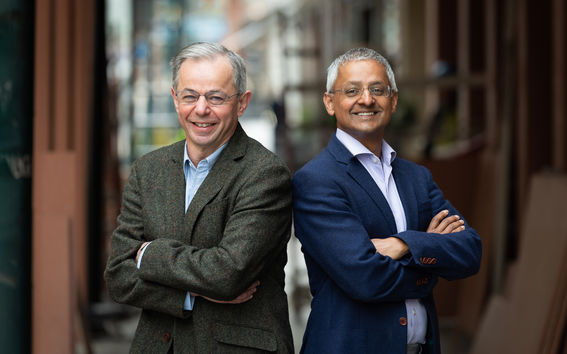Professor Shankar Balasubramanian and Professor David Klenerman win Millennium Technology Prize

Technology Academy Finland (TAF) has today, on 18 May, declared British Cambridge University professors Shankar Balasubramanian and David Klenerman as winners of the Millennium Technology Prize. The Prize is worth one million euros.
The duo’s Next Generation Sequencing (NGS) technology means DNA can now be read in super-fast times. This means huge benefits to society, from helping the fight against killer diseases such as COVID-19 or cancer, to better understanding crop diseases and enhancing food production.
Next generation sequencing provides an effective way to study and identify new coronavirus strains and other pathogens. With the emergence of the pandemic, the technology is now being used to track and explore the novel coronavirus viral mutations, which is growing global concern. This work has helped the creation of multiple vaccines now being administered worldwide and is critical to the creation of new vaccines against new dangerous viral strains. The results will also be used to prevent future pandemics. The International Selection Committee – the body of experts that evaluates all nominations for the prize – made its decision in February 2020, before the global spread of the COVID-19 pandemic.
Academy Professor Päivi Törmä is the Chair of the Millennium Technology Prize selection committee. ‘The technology will be a crucial element in promoting sustainable development through personalisation of medicine, understanding and fighting killer diseases, and hence improving the quality of life. Professor Balasubramanian and Professor Klenerman are worthy winners of the prize,’ says Päivi Törmä.
The technology has allowed a million-fold improvement in speed and cost when compared to the first sequencing of the human genome. In 2000, sequencing of one human genome took over 10 years and cost more than a billion dollars. Today, the human genome can be sequenced in one day at a cost of $1,000 and more than a million human genomes are sequenced at scale each year, thanks to the technology co-invented by Professor Balasubramanian and Professor Klenerman. This means we can understand diseases much better and much more quickly.
NGS technology has a huge transformative impact in the fields of genomics, medicine and biology. Today, DNA is also used to make nanostructures and materials. Related research is also conducted at Aalto University.
This is the first time that the prize has been awarded to more than one recipient for the same innovation, celebrating the significance of collaboration. Of the nine previous winners of the Millennium Technology Prize, three have subsequently gone to win a Nobel Prize.
The Millennium Technology Prize is a Finnish prize awarded in recognition of innovators of technologies that promote sustainable development and a better quality of life. The Prize is one of the world’s largest and most prestigious science and technology prizes and it is presented every other year by the independent Technology Academy Finland (TAF). The winning innovation is selected by the Board of the academy at the recommendation of the International Selection Committee.
Aalto University is a strategic partner of Technology Academy Finland. One of its roles is to propose new members for the International Selection Committee.
For more information
Millennium Technology Prize (millenniumprize.org)
Read more news
Eden Telila's master's thesis contributed to Ramboll's geotechnical toolkit
Geoengineering alum Eden Telila helped Ramboll automate manual tasks.
Join a Unite! matchmaking event on forging new consortia for Horizon Europe applications
Calling researchers and industry partners to connect at a virtual matchmaking session designed to spark project collaborations for Horizon Europe funding. Registration deadline, 12 March.
Apply Now: Unite! Visiting Professorships at TU Graz
TU Graz, Austria, invites experienced postdoctoral researchers to apply for two fully funded visiting professorships. The deadline for expressions of interest is 20 February 2026, and the positions will begin on 1 October 2026.






